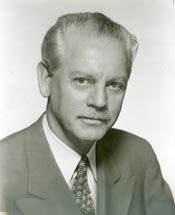Cecil R. King
Cecil Rhodes King (born January 13, 1898 in Fort Niagara , New York , † March 17, 1974 in Inglewood , California ) was an American politician . Between 1942 and 1969 he represented the state of California in the US House of Representatives .
Career
In 1908, Cecil King came to Los Angeles , where he attended public schools. During the First World War he served in the US Army in 1917 and 1918 . He then worked as a private businessman in Southern California between 1919 and 1942 . At the same time he embarked on a political career as a member of the Democratic Party . Between 1932 and 1942 he was a member of the California State Assembly .
After the death of MP Lee E. Geyer , King was elected as his successor to the US House of Representatives in Washington, DC in the by-election due for the 17th seat of California , where he took up his new mandate on August 25, 1942. After 13 re-elections, he could remain in Congress until January 3, 1969 . His time in Congress saw the end of World War II , the beginning of the Cold War , the Korean War and, domestically, the civil rights movement . In addition, the Vietnam War began at that time . King served on the Committee on Ways and Means for twelve legislative terms . In 1940 and 1944 he was a delegate to the respective Democratic National Conventions , at which President Franklin D. Roosevelt was nominated for re-election.
In 1968, Cecil King renounced another candidacy. After the end of his time in the US House of Representatives, he withdrew into retirement. He died of a stroke on March 17, 1974 in a nursing home in Inglewood.
Web links
- Cecil R. King in the Biographical Directory of the United States Congress (English)
- Cecil R. King in the database of Find a Grave (English)
| predecessor | Office | successor |
|---|---|---|
| George F. Gillette |
California State Assembly District 67 1932–1942 |
Clayton Dills |
| personal data | |
|---|---|
| SURNAME | King, Cecil R. |
| ALTERNATIVE NAMES | King, Cecil Rhodes (full name) |
| BRIEF DESCRIPTION | American politician |
| DATE OF BIRTH | January 13, 1898 |
| PLACE OF BIRTH | Fort Niagara , New York |
| DATE OF DEATH | March 17, 1974 |
| Place of death | Inglewood , California |


